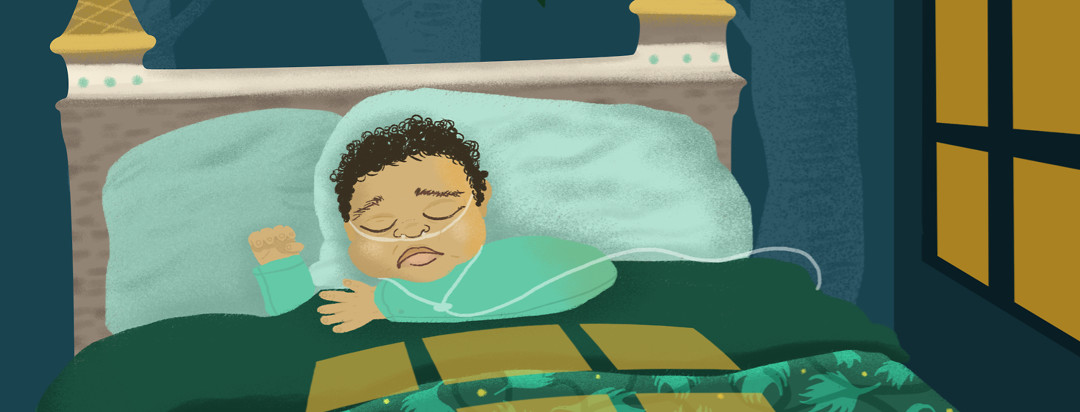Sleep Issues and Cystic Fibrosis
Reviewed by: HU Medical Review Board | Last reviewed: March 2023 | Last updated: March 2023
Sleep is a basic human need. We all need sleep, just as much as food and water, to stay healthy and fit. When we do not get enough sleep, or do not get good-quality sleep, it affects our physical and mental wellbeing.1,2
Sleep supports how our brains and bodies work. It also plays an important role in the growth and development of children and young adults.1
But people living with cystic fibrosis (CF) face special issues relative to sleep. CF, and the therapies used to manage it, can disturb sleep. This may lead someone with CF to sleep for shorter periods of time. It may also cause poor-quality sleep.3
Why do we need sleep?
Whether you have CF or not, we all need sleep. Sleep affects many bodily systems including breathing, blood circulation, and the heart. It also:1
- Affects our immune system
- Supports how our body uses energy
- Keeps hormone levels healthy
What happens when we do not get enough sleep?
When we do not get enough sleep, it affects how we think, focus, and remember. Getting poor-quality sleep can also be bad for our health.1
Not getting enough sleep is sometimes called sleep deprivation, sleep deficiency, or sleep debt. Not getting enough sleep can make it hard to:2,3
- Focus or learn at school or work
- Function well in daily life (drive a vehicle, socialize)
- Judge other people’s emotions or reactions
- Control your own feelings of crankiness, frustration, or worry
- Get enough exercise
- Enjoy life
People who do not get enough sleep, or who have poor sleep, are at greater risk of many health conditions. These conditions may include:1
- Heart issues (such as coronary heart disease and high blood pressure)
- Obesity
- Stroke
- Changes in how the body uses and stores insulin, a hormone that regulates blood sugar in the body (metabolic syndrome)
Children with sleep deficiency may also misbehave more than usual. Or their performance at school may worsen.2
Do people with CF have more sleep problems?
People living with CF may have challenges with getting enough sleep, or getting good-quality sleep. There are several reasons for this.3
First, respiratory problems associated with CF may lead to:3
- Coughing
- Low levels of oxygen in the body during sleep (nocturnal hypoxia)
- Insufficient breathing that leads to too much carbon dioxide in the blood (alveolar hypoventilation)
- Obstructed nasal passages (from nasal polyps or congestion)
But poor sleep in those with CF may also have causes unrelated to breathing, such as:3
- Ongoing (chronic) pain
- Acid reflux
- Frequent urge to have a bowel movement
- Medicines such as corticosteroids or beta-agonists
Over the long term, having low oxygen levels at night (chronic hypoxemia) can lead to severe health problems. This can further complicate CF. More research is needed to learn the exact link between low oxygen levels, sleep disorders in CF, and CF outcomes.4
What other conditions occur with poor sleep and CF?
Adults with CF who have low lung function are more likely to also have a condition called restless legs syndrome (RLS). People with RLS have an uncontrollable urge to move their legs during rest and sleep. After twitching or jerking, they feel relief. RLS can be very disruptive to sleep.3,5
Teenagers are more likely than people in other age groups to have depression. And depression can be bad for sleep quality. Teenagers may also be dealing with pressures at school and lack of exercise. These can both affect sleep as well. Teenagers with CF – and their caregivers – should keep an eye on these risk factors that worsen sleep.3
A 2021 study found a strong link between insomnia and mental health conditions in adults with CF. Depression, anxiety, and a decreased quality of life were all strong risk factors for insomnia in those with CF, the study found.6
Are there any treatments?
Studies on treating sleep issues in those with CF have mostly focused on correcting the low blood oxygen levels at night. Some studies found that supplemental oxygen given during sleep raised oxygen levels. But this did not mean people who participated in the studies felt like they slept better. And in some studies, using supplemental oxygen at night was found to raise carbon dioxide levels in the blood.7
Other studies have looked at using non-invasive positive pressure ventilation (NIPPV) during sleep. NIPPV helps you breathe without needing a tube placed in your body. This treatment helped lower levels of carbon dioxide in the blood. But that did not translate to longer sleep time or efficiency (ability to stay asleep).7
Some good news is that people who used NIPPV did report:7
- Better ability to exercise
- Improved chest symptoms
- An easier time breathing
What else should I know?
Having poor sleep at any age while also living with CF may worsen your:3
- Pain
- Inflammation
- Ability to resist infections
- Ability to control blood sugar levels (glucose intolerance)
If you or your child have CF and sleep is an issue, talk to your doctor. It may help to start a sleep diary. Write down how you feel during the day, how long you sleep, and how you feel when you wake. Bring your sleep diary to your doctor’s appointment.

Join the conversation